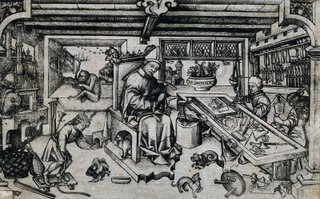
SAINT ELIGIUS
Bishop
Eligius, a goldsmith at Paris, was commissioned by King Clotaire to make a throne. With the gold and precious stones given him he made two. Struck by his rare honesty, the king gave him an appointment at court, and demanded an oath of fidelity sworn upon holy relics; but Eligius prayed with tears to be excused, for fear of failing in reverence to the relics of the Saints. On entering the court he fortified himself against its seductions by the austerities and continual ejaculatory prayers. He had a marvelous zeal for the redemption of captives, and for their deliverence would sell his jewels, his food, his clothes, and his very shoes, once by his prayers braking their chains and opening their prisons. His great delight was in making rich shrines for relics. His srtiking virtue caused him, a layman and a goldsmith, to be made Bishop of Noyon, and his sanctity in this holy office was remarkable. He possessed the gifts of miracles and prophecy, and died in 665.
Mass of a CONFESSOR BISHOP,
Prayer
O Almighty God, grant that our solemn celebration of the feast of Your confessor bishop Eligius may increase our devotion and bring us closer to our salvation. Through Our Lord . . .
MEDIATOR DEI
Continued
Methods of Participation:
The faithful may participate in the Holy Sacrifice in many ways. They may use the missal so that, united with the priest, they pray together in the very words of the Church. They may make the responses with the server, they may sing hymns suitable to the different parts of the Mass, or do both. Finally at High Mass they may make the responses and also sing the liturgical chant. All these methods are commendable when they agree with the precepts of the Church and the rubrics of the liturgy. They aim at developing piety and greater union with Christ and His representative. They show the social character of the Mass as the act of the whole Mystical Body of Christ.
[Excerpted from 'Mediator Dei', Pius XII]
Mass of a CONFESSOR BISHOP,
Prayer
O Almighty God, grant that our solemn celebration of the feast of Your confessor bishop Eligius may increase our devotion and bring us closer to our salvation. Through Our Lord . . .
MEDIATOR DEI
Continued
Methods of Participation:
The faithful may participate in the Holy Sacrifice in many ways. They may use the missal so that, united with the priest, they pray together in the very words of the Church. They may make the responses with the server, they may sing hymns suitable to the different parts of the Mass, or do both. Finally at High Mass they may make the responses and also sing the liturgical chant. All these methods are commendable when they agree with the precepts of the Church and the rubrics of the liturgy. They aim at developing piety and greater union with Christ and His representative. They show the social character of the Mass as the act of the whole Mystical Body of Christ.
[Excerpted from 'Mediator Dei', Pius XII]